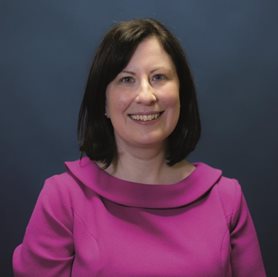Sunday, February 11, 2024, marks the 9th International Day of Women and Girls in Science. This year, the UN has chosen the theme "Women in Science Leadership: A New Era for Sustainability."
To commemorate this event, ESTRO has decided to feature a series of interviews with exceptional women who have played a key role in steering the Society and are shaping the future of Radiation Oncology. Today, we hear from Michelle Leech, Editor-in-Chief of tipsRO.
What inspired your decision to pursue a career in Radiation Oncology? Were there specific experiences or individuals that influenced your choice?
At school, I was always very interested in science, though I was probably academically ‘better’ at English literature and music! But science challenged me to think about the world in a different way.I had personal family experience of chronic illness since I was a young child, and that made me interested in caring for patients. Taken together, I was intrigued by how medical practice should be underpinned by science and how patients should be managed in a person-centred manner, which unfortunately has not been my own family’s experience.
Radiation oncology as a specialty fascinated me with its unique combination of patient care, technology, and the need for attention to detail. It still does today.
Do you anticipate that young women aspiring to follow a similar path will encounter the same challenges? How might their experiences differ, and what positive changes do you foresee for them?
I am not sure that I really faced what could be called challenges in my own career, relative to what is faced by radiation therapists in other parts of the world. For sure, when I came to ESTRO originally, I was surprised and extremely challenged by the variety in education and training standards of radiation therapists across Europe, and subsequently globally, in my work with the International Atomic Energy Agency (IAEA). I really was not prepared for this as in Ireland, only students within the highest 10% of final school grades nationally enter the radiation therapy degree programme, which is an honours science degree. Therefore, I have never faced the challenges of inequality and hierarchy within the radiation oncology team that some of my colleagues in other countries have. Happily, I do believe that this is changing, through the empowerment of radiation therapists via educational initiatives like the ESTRO IAEA Train the Trainers programme and our recent considerable success in having the title ‘Radiation Therapist’ recognised at European Commission level.
If you could offer advice to young women aspiring to pursue a career in Radiation Oncology, what key insights or recommendations would you share based on your own experiences?
Do it! Radiation Oncology is a cutting-edge specialty, highly innovative and massively rewarding in terms of finding the best outcomes for our patients. We need more young, motivated advocates for our specialty in all areas of the world. It is a career that will inspire, motivate, and, of course, sometimes frustrate you, but the latter is because we only want the best care for all patients globally. It is also a career that will hone your team skills. I can genuinely say that I love my job and going to work every day - that is probably the greatest endorsement I can give for this specialty.

Michelle Leech, tipsRO Editor-in-Chief
Professor in Radiation Therapy, Trinity College Dublin, Ireland